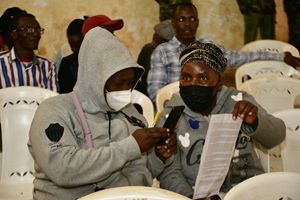Tough times for Kenya’s elderly as world marks day of older persons

Elderly people during the launch of Inua Jamii programme in Elburgon, Nakuru County on September 04, 2023.
A sick man with itchy, scaly skin was not taken to hospital for days even as his disease got worse by the day. Foodstuffs donated by well-wishers were carted away in cars as the residents starved. Caregivers even wielded canes to “discipline” the senior citizens who broke rules.
Those were among the sobering realities exposed by the BBC after it sent undercover journalists to work as caregivers at the Thogoto Home for the Aged in the outskirts of Nairobi. When the investigation was aired in August, there was widespread outrage and calls for a review of the laws governing such institutions.
The government says all is now well at the home. Mr Joseph Motari, the principal secretary in the Department of Social Protection and Senior Citizen Affairs, told the Sunday Nation that he visited the home after the investigative story was aired, met with the Presbyterian Church of East Africa that owns the home and ironed things out.
“Everything has so far been sorted,” he said.
As the world marks the International Day of Older Persons today, the government standards for care homes are under sharp focus from lobby groups. One of the groups advocating for the better welfare of the elderly is the Kenyan chapter of the Association of Former International Civil Servants (Afics-Kenya), which comprises former United Nations staff and those retired from other inter-governmental agencies.
“A number of them (care homes) are not licensed and they don’t have well trained staff. Despite the funds they are getting from various sources, they have been mistreating senior citizens under their care,” said Dr John Kakonge, the president of Afics-Kenya.
“The responsible government department should do spot-checks from time to time to ensure that the organisations caring for senior citizens are following proper guidelines and the people who are working in these facilities are able to address challenges like dementia,” he added.
To mark the UN-recognised observance marked on October 1 every year, the government will today hold an event in Nanyuki that will be presided over by Labour and Social Protection Cabinet Secretary Simon Chelugui.
Tomorrow, Mr Motari will join Afics-Kenya at a symposium at the UN Complex in Gigiri under the theme “The Journey to Quality Ageing”. According to the programme seen by the Sunday Nation, he will make the official opening remarks.
Afics-Kenya members who spoke with us stressed on the need to have regulations.
“It is not a surprise that we hear of elder abuse because we don’t have standards of operation, you know, standard operational procedures that guide a whole lot of things: speech therapy, mental therapy, physical therapy, all of those things in home care,” said Prof Wariara Mbugua, an expert on peace studies and conflict resolution and also a certified mediator.
“For me, some of the cases of elder abuse are very insidious. When you hear parliamentarians disapproving of an older person’s appointment based only on age, not on competence, what signals does that send? So, the government needs to walk the talk,” she added.
Changing times
Ms Deborah Otihinda, a widely travelled ex-UN employee, noted: “In the first place, when do we decide as Africans, in the African culture, to take our parents to a home? Because this never used to be there. So, we find these are unique cases. We are used to our culture whereby we take care of our elders at home. So, when they are taken to homes, it is very unique.”
The global theme of today’s observance is: “Fulfilling the Promises of the Universal Declaration of Human Rights for Older Persons: Across Generations”.
“The event will put a spotlight on the specificity of older persons around the world, for the enjoyment of their rights and in addressing violations, and how the strengthening of solidarity through equity and reciprocity between generations offers sustainable solutions to deliver on the promise of the Sustainable Development Goals,” says UN Secretary-General Antonio Guterres in a message on the UN website.
According to Dr Shem Ouma, the director for research, strategy and planning at the Retirement Benefits Authority, Kenya is rapidly becoming westernised in the sense that care homes are gaining more acceptance.
“Our culture has been very strongly influenced by Western culture through education and religion. Effects can be seen in smaller households as opposed to our earlier system. The implication is that the household can no longer provide old age care to its old membership. Families are living apart and sometimes over long distances. Even if they wanted to provide that care, they are not able to. The African family care system has broken down. The solution seems to be old-age care homes, manned by trained personnel, meeting standards required and are overseen by a sort of regulatory body to avoid abuses,” he told the Sunday Nation.
Cash transfer
Mr Motari said the government’s cash transfer programme is one of the ways it is taking care of the elderly. He noted that as of yesterday, the government was finishing up on registration of 1.1 million senior citizens into the programme.
“We are coming up with a system where we shall be upgrading them automatically; that when you are 70 years and above, (you are added) to the cash transfer programme,” he said.
In the 2019 census, there were 2.066 million women aged above 55. Men in the same category were 1.793 million. That translated to about eight per cent of the total population.





